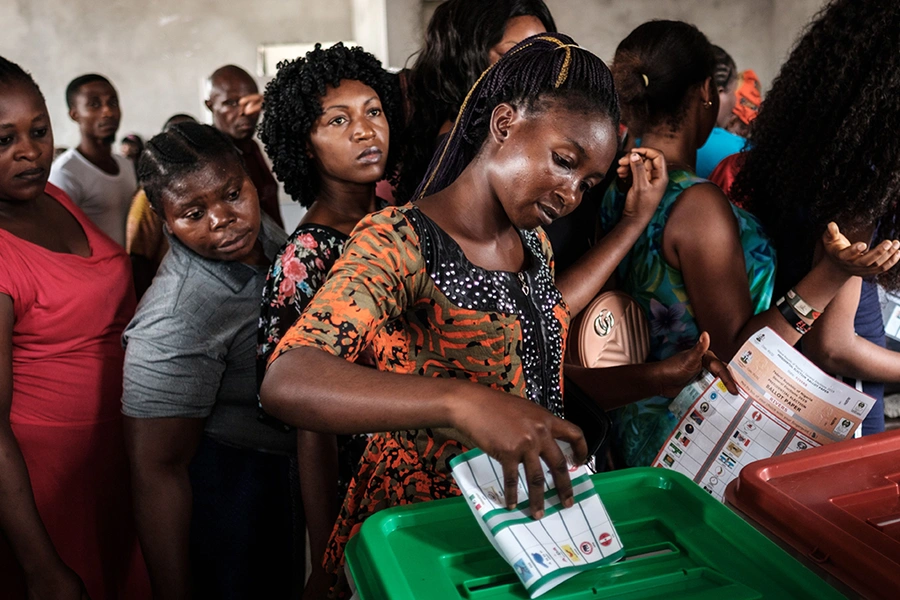Nigeria, Africa's most populous nation and largest democracy, is grappling with an alarming trend: declining voter turnout. The nation’s democratic landscape is witnessing a silent crisis. The gubernatorial election in Edo State have sounded an alarm that echoes across the nation: voters are disappearing from the polls at an alarming rate. Voter participation is dwindling at an unprecedented rate, sending shockwaves through the country's political system. This exodus from the polling booths not only undermines the core principles of representative governance but also casts a foreboding shadow over the legitimacy of future elections.
The rate of decline over the years:
· 2012 to 2016: 6.4 percentage decrease
· 2016 to 2020: 8.5 percentage decrease
· 2020 to 2024: 1.8 percentage decrease
The Edo State 2024 gubernatorial election saw a voter turnout of just 22.4%, a sharp decline from previous years. Data from Kimpact Development initiative, a non-profit organisation whose work focuses on citizens, democracy, and governance, shows a consistent decline in voter turnout from 2012 to 2024. These numbers paint a picture of a democracy where the majority chooses silence over suffrage.
The most significant drop occurred between 2016 and 2020, which coincides with the COVID-19 pandemic. The crucial season of the pandemic likely had a substantial impact on voter participation due to health concerns, disruptions in voter education efforts, and potential economic hardships that may have shifted focus away from political engagement. The slower rate of decline between 2020 and 2024 might indicate some level of stabilisation post-COVID, but it's important to note that turnout has not rebounded to pre-pandemic levels. This suggests that other factors beyond the pandemic are influencing voter participation in Nigeria, in this case, Edo State. challenges.
Several factors contributes to this voter vanishing act; repeated unfulfilled campaign promises that have left voters skeptical, fears of election-related violence that keep many at home, logistical labyrinth i.e the complex registration process and distant polling units, negative perceptions of INEC, economic priorities, amongst others.
Unfortunately, the trend is not a localised phenomenon but a part of a broader pattern in Nigeria. At the national level, voter turnout has been decreasing since 2003. In 1999, the turnout was 52.3%, which increased to 69% in 2003. However, it dropped to 57.5% in 2007,53.7% in 2011, 43.7% in 2015, 34.8% in 2019 and 29% in 2023 elections. This downward trajectory is particularly concerning given Nigeria's young and growing population.
This trend in Edo serves as a canary in the coal mine for upcoming gubernatorial races and even general elections across Nigeria. The implications are profound, as they undermine the legitimacy of elected officials, widen the representation gap, and create a policy vacuum where decisions may not reflect the broader population’s will. Reversing the trend of low voter turnout is crucial for Nigeria's democracy to thrive. It requires concerted efforts from government bodies, civil society organizations, and citizens themselves. Only through active participation can Nigerians ensure that their voices are heard and their democracy thrives.
.png)
The Road Ahead: A Call to Action
The Ondo gubernatorial election is scheduled to take place on November 16, 2024. As it approaches, the lessons from Edo State must not be ignored.
Some of the key lessons are;
· Weather conditions can significantly affect voter turnout. The rain likely discouraged some voters from leaving their homes to cast their ballots, contributing to the low turnout. This highlights the importance of weather preparedness in election planning.
· Efficient distribution of election materials is crucial for timely voting processes. Late commencement of voting due to logistical issues can discourage voters, especially those with time constraints. This may have contributed to the low turnout as some voters might have left polling stations without voting or decided not to show up at all after hearing about delays.
· Vote-buying remains a significant challenge in ensuring free and fair elections. While vote-buying might incentivize some to turn out, it can also discourage honest voters who feel their vote won't make a difference, potentially lowering overall turnout.
· The threat of violence can significantly impact voter behavior and turnout. Fear of violence likely kept some voters away from polling stations, contributing to low turnout. This underscores the importance of security measures in encouraging participation.
These lessons highlight the complex interplay of factors affecting voter turnout. Addressing these issues systematically could help improve participation in future elections.
The vanishing voter phenomenon is not just a statistic; it's a challenge to the very essence of democracy. It's time for a nationwide effort to reignite the passion for civic participation and ensure that the voice of every Nigerian is heard at the ballot box. The choice is clear: act now to reverse this trend, or risk witnessing the further erosion of democratic participation. The future of Nigeria's democracy hangs in the balance, and every vote – present or absent – will shape that future.

